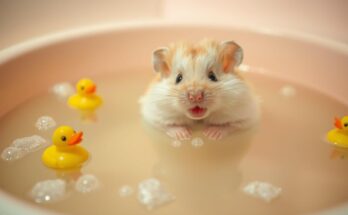PetSmart is a popular destination for pet lovers, offering a variety of pets, including hamsters. For many, the question “Are PetSmart hamsters healthy?” is a crucial one when considering bringing one of these small, furry creatures into their home.
Hamsters can make delightful pets, known for their gentle nature, adorable appearance, and relatively easy care. However, the health of the hamster you choose is paramount to ensuring a happy, long-lived pet. This article aims to provide a comprehensive overview of the health standards of PetSmart hamsters, giving potential pet owners the information they need to make an informed decision.
Understanding PetSmart’s Hamster Selection
The Variety of Hamsters at PetSmart
PetSmart offers a range of hamster species, each with unique traits and care requirements. The main types available include Syrian hamsters, dwarf hamsters, and Roborovski hamsters.
Syrian Hamsters: These are the most popular type of hamster due to their size and docile nature. Syrian hamsters are solitary animals and must be housed alone to prevent aggressive behavior.
Dwarf Hamsters: This category includes several species such as the Campbell’s dwarf hamster, the Winter White dwarf hamster, and the Chinese hamster. They are smaller than Syrians and can often be housed in pairs or small groups if introduced properly.
Roborovski Hamsters: Known for their small size and energetic behavior, Roborovski hamsters are less common but are adored for their lively antics.
Hamster Origins and Breeding Practices
Understanding where PetSmart sources its hamsters is crucial to assessing their health. PetSmart typically sources its hamsters from large-scale breeders. The conditions in which these hamsters are bred and raised can significantly impact their health and well-being. Reputable breeders follow stringent guidelines to ensure the animals are healthy and free from genetic defects, while poor breeding practices can result in health issues that may not be immediately apparent.
PetSmart claims to partner with breeders who adhere to high standards of animal care. These breeders are required to meet specific criteria related to the health, handling, and housing of the animals. Regular audits and inspections are purportedly conducted to ensure compliance. However, as with any large retailer, the quality of these practices can vary, and it’s important for potential buyers to do their own research and ask questions.
Health Standards and Practices at PetSmart
Health Screenings and Veterinary Care
PetSmart states that all their hamsters undergo health screenings before being made available for sale. These screenings are intended to check for common ailments and ensure that the animals are in good condition. The hamsters are also monitored for signs of illness during their stay at the store.
Veterinary care is a critical component of these health screenings. PetSmart has in-house veterinarians and partnerships with local veterinary clinics to provide necessary medical attention to their animals. If a hamster shows signs of illness, it is supposed to receive treatment before being cleared for sale. This proactive approach is meant to minimize the risk of customers taking home a sick pet.
Living Conditions in Stores
The living conditions of hamsters while they are in PetSmart’s care can significantly affect their health. In-store environments should mimic the hamster’s natural habitat as closely as possible to reduce stress and prevent health issues.
Cage Size: Hamsters require ample space to move around and explore. PetSmart typically houses their hamsters in enclosures that meet minimum size requirements. However, it’s important for customers to ensure that they provide a sufficiently large cage once they bring their hamster home.
Cleanliness: Regular cleaning of the enclosures is essential to prevent the buildup of waste, which can lead to infections and other health problems. PetSmart maintains that their cages are cleaned regularly and that fresh bedding is provided frequently.
Enrichment: Providing toys, tunnels, and other forms of enrichment helps keep hamsters mentally and physically stimulated. This can prevent boredom-related behaviors and promote overall well-being. PetSmart stores usually have a variety of enrichment items in their hamster enclosures.
Common Health Issues in PetSmart Hamsters
Recognizing Signs of a Healthy Hamster
Before purchasing a hamster, it’s crucial to know the signs of a healthy animal. A healthy hamster will exhibit bright, clear eyes, clean fur, and an active demeanor. Here are some key indicators:
- Eyes: Should be bright and free from discharge.
- Nose: Should be dry and clean, without any signs of mucus.
- Ears: Should be clean and upright.
- Fur: Should be smooth and free of bald patches or signs of parasites.
- Teeth: Should be properly aligned and not overgrown.
- Behavior: Should be active and curious, not lethargic or overly aggressive.
Potential Health Problems
Despite best efforts, hamsters can still face health issues. Some common problems include:
Wet Tail: This is a severe intestinal infection that is highly contagious and often fatal if not treated promptly. Symptoms include diarrhea, lethargy, and a wet appearance around the tail area.
Respiratory Infections: Hamsters are susceptible to respiratory infections, which can be caused by poor living conditions or sudden changes in temperature. Symptoms include sneezing, discharge from the eyes or nose, and difficulty breathing.
Dental Problems: Hamster teeth continuously grow, and without proper wear, they can become overgrown, leading to eating difficulties and infections.
Parasites: Mites and other parasites can infest hamsters, causing itching, hair loss, and skin infections.
Customer Experiences and Reviews
Positive Experiences
Many customers report positive experiences with PetSmart hamsters. They appreciate the store’s knowledgeable staff, the availability of health guarantees, and the overall health of the animals. Here are some examples of positive feedback:
- Health Guarantees: PetSmart often offers a short-term health guarantee, allowing customers to return or exchange a hamster if it shows signs of illness within a specified period.
- Knowledgeable Staff: Many customers praise the staff for their knowledge and willingness to help with questions about hamster care.
- Healthy Hamsters: Numerous buyers have reported that their PetSmart hamsters are healthy and have lived long, happy lives with proper care.
Negative Experiences
Despite the positive feedback, some customers have had negative experiences. Common complaints include:
- Illness: Some customers report purchasing hamsters that became ill shortly after being brought home. This could be due to stress from relocation or underlying health issues that were not detected during store screenings.
- Behavioral Issues: There are instances where hamsters exhibit aggressive behavior, which might stem from improper handling or insufficient socialization.
- Living Conditions: A few customers have raised concerns about the living conditions of hamsters in PetSmart stores, citing overcrowded cages and lack of enrichment.
Tips for Ensuring Your Hamster’s Health
Choosing a Healthy Hamster
When selecting a hamster from PetSmart, it’s important to observe the animal carefully. Here are some tips to help you choose a healthy pet:
- Observe Behavior: A healthy hamster will be active and curious. Avoid hamsters that seem lethargic or overly aggressive.
- Check for Signs of Illness: Look for any signs of discharge from the eyes or nose, clean fur, and a healthy weight.
- Ask Questions: Don’t hesitate to ask the staff about the hamster’s history, diet, and any health issues it may have had.
Proper Hamster Care at Home
Bringing a hamster home means committing to its ongoing care. Proper care involves providing a suitable living environment, a balanced diet, and regular health checks. Here’s what you need to know:
Housing: Ensure your hamster has a spacious cage with plenty of room to explore. Include tunnels, wheels, and toys to keep them entertained. The cage should have a solid floor and be easy to clean.
Diet: Hamsters need a balanced diet that includes a mix of pellets, fresh vegetables, and occasional treats. Fresh water should always be available.
Enrichment: Provide toys, chew items, and opportunities for exploration to keep your hamster mentally stimulated. Rotate toys regularly to keep things interesting.
Health Checks: Regularly check your hamster for signs of illness. This includes monitoring their weight, looking for any changes in behavior, and ensuring their teeth are not overgrown.
Veterinary Care: Find a veterinarian experienced with small animals and schedule regular check-ups. If your hamster shows any signs of illness, seek veterinary care immediately.
Comparing PetSmart Hamsters to Other Sources
PetSmart vs. Independent Pet Stores
When considering where to buy a hamster, it’s helpful to compare PetSmart to independent pet stores. Each has its advantages and disadvantages.
Advantages of PetSmart:
- Wide Selection: PetSmart often has a larger selection of hamsters to choose from.
- Health Guarantees: Many PetSmart locations offer health guarantees, providing peace of mind for new pet owners.
- Convenience: With numerous locations, PetSmart is easily accessible for many people.
Disadvantages of PetSmart:
- Variable Quality: The quality of care can vary between locations, affecting the health of the hamsters.
- Large-Scale Breeding: Hamsters are often sourced from large-scale breeders, which may not provide the same level of care as small, independent breeders.
Adopting from Shelters and Rescues
Another option is to adopt a hamster from a shelter or rescue organization. This can be a rewarding experience and often results in a healthier pet.
Advantages of Adoption:
- Health Checks: Shelters and rescues typically conduct thorough health checks before adopting out animals.
- Support: These organizations often provide ongoing support and advice for new pet owners.
- Saving a Life: Adopting a hamster gives an animal in need a second chance at a happy life.
Disadvantages of Adoption:
- Limited Selection: The selection of hamsters may be limited, depending on the shelter or rescue.
- Unknown Background: The history of adopted hamsters may be unknown, which can make predicting future health issues challenging.
Frequently Asked Questions
1. Are PetSmart hamsters vaccinated?
No, hamsters do not require vaccinations. PetSmart ensures they are free from common illnesses before sale.
2. How can I tell if a PetSmart hamster is healthy?
Look for bright eyes, clean fur, and active behavior. Avoid hamsters that appear lethargic or have discharge from their eyes or nose.
3. Do PetSmart hamsters come with a health guarantee?
Yes, PetSmart typically offers a short-term health guarantee, allowing you to return or exchange a sick hamster within a specified period.
4. What should I do if my PetSmart hamster gets sick?
Consult a veterinarian immediately. PetSmart can provide initial advice, but professional veterinary care is crucial.
5. Are dwarf hamsters from PetSmart healthy?
Dwarf hamsters can be healthy if properly cared for. Ensure they are active and alert when choosing.
6. How does PetSmart ensure the health of their hamsters?
PetSmart follows health screening protocols and provides veterinary care when needed. They also maintain clean living conditions.
7. Can PetSmart hamsters live alone or do they need companions?
Syrian hamsters should live alone due to territorial behavior, while dwarf hamsters can live in pairs or groups if introduced correctly.
8. What is the average lifespan of a PetSmart hamster?
With proper care, PetSmart hamsters can live 2-3 years, though some may live longer depending on their health and genetics.
Conclusion
So, are PetSmart hamsters healthy? While PetSmart follows protocols to ensure their hamsters’ health, individual experiences can vary. By understanding the store’s practices and providing proper care at home, you can help ensure your PetSmart hamster leads a healthy and happy life.
It is important to remember that the health of any pet, including a hamster, is a shared responsibility. The retailer plays a crucial role in providing healthy animals, but the ultimate responsibility lies with the pet owner to provide ongoing care, a suitable living environment, and prompt medical attention when needed. By being informed and proactive, you can give your hamster the best chance at a long, healthy life.


